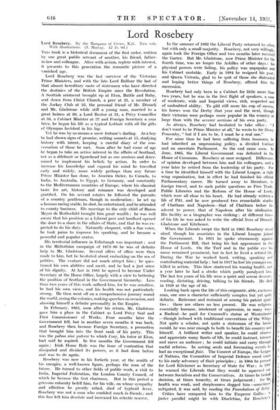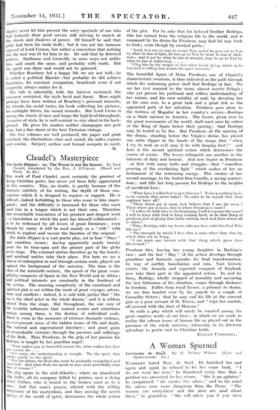Lord Rosebery
Lord Rosebery. By the Marquess of Crewe, K.U. Two vols. With illustrations. (J. Murray. £2 2s. Od.)
Tins book is a historical document of the first order, written by one great public servant of another, his friend, father- in-law and colleague. Alive with action, replete with interest, it presents to this generation the romantic picture of a vanished age.
Lord Rosebery was the last survivor of the Victorian Prime Ministers, and with the late Lord Balfour the last of that almost hereditary caste of statesmen who have directed the destinies of the British Empire since the Revolution. A Scottish aristocrat brought up at Eton, Battle and Raby, sent down from Christ Church, a peer at 21, a member of the Jockey Club at 23, the personal friend of Mr. Disraeli and Mr. Gladstone while still a young man, married to a great heiress at 30, a Lord Rector at 31, a Privy Councillor at 34, a Cabinet Minister at 37 and Foreign Secretary a year later, he began his life as a typical Lothair with all the gifts of Olympus lavished in his Lap.
Yet he was by no means a mere fortune's darling. As a boy he had shown signs of promise, writing sonnets at 15, studying history with intent, keeping a careful diary of the con- versation of those he met. Soon after he had come of age he began to take an active interest in the affairs of Scotland, not as a dilettante or figurehead but as one anxious and deter- mined to implement his beliefs by action. In order to increase his knowledge and expand his mind he travelled early and widely, more widely perhaps than any future Prime Minister has done, to America thrice, to Canada, to India, to Australia, to Egypt, to Germany, and constantly to the Mediterranean countries of Europe, where his classical taste for art, history and romance was developed and gratified. On his several estates he followed the pursuits of a country gentleman, though in moderation ; he set up a famous racing stable, he shot, he entertained, and he attended to county business. His marriage to the only child of Baron Meyer de Rothschild brought him great wealth ; he was well aware that his position as a Liberal peer and landlord opened the door to a share in the affairs of State, and that he was ex- pected to do his duty. Naturally eloquent, with a fine voice, he took pains to improve his speaking, and he became a powerful and popular orator.
His territorial influence in Edinburgh was important ; and in the Midlothian campaign of 1879-80 he was of definite help to Mr. Gladstone. Several offers of office were theft made to him, but he hesitated about embarking on the sea of politics. The venture did not much attract him ; he ques- tioned his own abilities and merit, and he had a just sense of his dignity. At last in 1881 he agreed to become Under Secretary at the Home Office, largely with a view to bettering the position of Scotland in the Government hierarchy. Less than two years of this work sufficed him, for he was sensitive, he had his own views, and his health was not particularly strong. He then went off on a comprehensive journey round the world, seeing the colonies, making speeches on occasion, and showing himself a definite personality in the Empire.
In February, 1885, soon after his return, Mr. Gladstone gave him a place in the Cabinet as Lord Privy Seal and First Commissioner of Works. Four months later the Government fell, but in another seven months it was back, and Rosebery then became Foreign Secretary, a promotion that brought him into the front rank of his party. This
was the palma sine pulvere to which Cory, his tutor at Eton, had said he aspired. In five months the Government fell
again Irish Home Rule was the bone of contention that dissipated and divided its powers, as it had done before and was to do again.
Rosebery was now in his fortieth year, at the zenith of his energies, a well-known figure, perhaps the man of the future. He turned to other fields of public work, a visit to India, Imperial Federation, the London County Council, of which he became the first chairman. But in this period a grievous calamity befell him, for his wife, on whose sympathy and affection he greatly relied, died of typhoid fever. Rosebery was not a man who confided much in friends ; and this loss left him desolate and increased his eclectic reserve. In the summer of 1892 the Liberal Party returned to office, but with only a small majority. Rosebery, not very willingly, again took the Foreign Office and two months later received the Garter. But Mr. Gladstone, now Prime Minister for the fourth time, was no longer the Achilles of other days : his physical powers were failing, his policy was unpopular and his Cabinet unstable. Early in 1894 he resigned his post; and Queen Victoria, glad to be quit of those she distrusted and hoping better things of Rosebery, offered him the succession.
Rosebery had only been in a Cabinet for little more than two years, but he was in the first flight of speakers, a man of moderate, wide and Imperial views, rich, respected and of undoubted ability. To gild still, more his cup of success, his horses won the Derby that year and the next, though their victories were perhaps more popular in the country at large than with the severer sections of his own party.
As always, Rosebery had hesitated to take office : " don't want to be Prime Minister at all," he wrote to Sir henry Ponsonby, " but if I am to be, I must be a real one."
- For some time he had been suffering from insomnia, he had inherited an unpromising policy, a divided Cabinet and an uncertain Parliament. So the end came soon. In June, 1895, the Liberal Government was defeated in the House of Commons. Rosebery at once resigned. Differences of opinion developed between him and his colleagues, and a year later he retired from the leadership of his party. For a time he identified himself with the Liberal League, a right wing organization, but in effect he had finished his official Parliamentary career. He turned away to literature, to foreign travel, and to such public questions as Free Trade, Public Libraries and the Reform of the House of Lords, which were all close to his heart. He had already written a life of Pitt, and he now produced two remarkable studies of Chatham- and Napoleon—that of Chatham before his advent to power, that of Napoleon after his abdication. His facility as a biographer was striking : at different times of his life he was asked to write the official lives of Disraeli, Gladstone and Kitchener.
When the Liberals swept the field in 1905 Rosebery stood aloof, though his associates in the Liberal League joined the Government. In 1911 he spoke strenuously against the Parliament Bill, that being his last appearance in the House of Lords. On the Turf and in the public eye his name remained prominent, but in fact he lived a retired life. During the War he worked hard, writing, speaking and contributing material help ; but in 1917 he lost his younger son, killed in action. This blow shattered his waning health, and a year later he had a stroke which partly paralysed him. The last ten years of his life were a quiet and serene descent ; reading, dictating, driving, talking to his friends. He died in 1929 at the age of 82.
Looking back upon the life of this enigmatic, able, exclusive man, one sees a character sufficiently complex but yet quite definite. Reticence and restraint at among his patent quali- ties : there are others no less present. He was religions. essentially humane, intolerant of oppression, in many ways a Radical—he paid for Cromwell's statue at Westminster —though imbued with traditional conventions of the Whip. Not quite a scholar, not quite a statesman of the heroic mould, he was near enough to both to benefit his country and himself. A brilliant writer and speaker, he could observe and appreciate many facets of life, he could instruct, interest
and move an audience ; he could initiate and carry through
useful reforms. In sowing seeds and forecasting events he had an exceptional flair. The Concert of Europe, the League
of Nations, the Committee of Imperial Defence owed much to his early advocacy of their principles ; in 1904 he pressed for Lord Kitchener as Secretary of State for War ; in ltlff;
he warned the Liberals that they would be squeezed out between Socialism and the Conservatives. At times he lacked decision, at times tenacity, at times judgement ; for las, health was weak, and sleeplessness dogged him—sometimes mitigated, it was said, by reading the Foundations of Better•
Critics have compared him to the Emperor Galba : juster parallel might be with Diocletian, for Rosebery' dignity never let him present the sorry spectacle of one who had formerly done good service still striving to snatch at the shreds and shadows of power. Of himself he said that pride had been his main fault ; but it was not the immense orgueuil of Lord Curzon, but rather a conviction that nothing but the best was fit for him to do. He said that he detested politics. Shelburne and Grenville, in some ways not unlike him, said much the same, and probably with truth. But the spirit was there and would not be gainsaid.
Whether Rosebery led a happy life we are not told—he is called a political Hamlet—but probably he did achieve happiness, for constant occupation, beneficent even if not congenial, always makes for it.
The tale is admirably told, the interest sustained, the continent restricted, the style lucid and fluent. More might perhaps have been written of Rosebery's personal interests, his friends, his social tastes, his book collecting, his pictures, his midnight drives, his casual remarks. But Lord Crewe is among the wisest of men and keeps the high level throughout. A master of style, he is well content to stay silent in the back- ground. He gives his readers neither champagne nor port wine, but a fine claret of the best Victorian vintage.
The two volumes are well produced, the paper and print excellent, the illustrations clear and varied, the index copious and concise. Subject, author and format compete in merit. M.



































 Previous page
Previous page